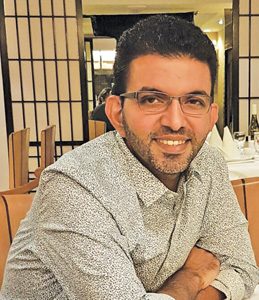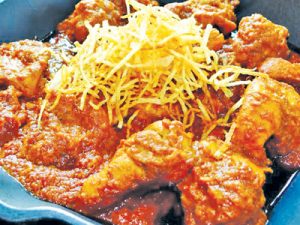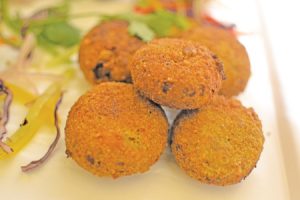 Let me begin with a saying from my college professor who quoted “It’s the attitude, not the aptitude that decides a person’s altitude”. I had numerous career aspirations – none inclined towards being a caterer and not in the least, a chef! Born in a renowned Parsi Caterer’s family, I didn’t feel the need to learn cooking and creating recipes. As would luck had it, I enrolled for Hotel Administration and Food Technology at the Sophia Polytechnic in Mumbai. Not having given much thought to an area of specialization, I stumbled into the kitchen department and applied as a cook at the Oberoi’s.
Let me begin with a saying from my college professor who quoted “It’s the attitude, not the aptitude that decides a person’s altitude”. I had numerous career aspirations – none inclined towards being a caterer and not in the least, a chef! Born in a renowned Parsi Caterer’s family, I didn’t feel the need to learn cooking and creating recipes. As would luck had it, I enrolled for Hotel Administration and Food Technology at the Sophia Polytechnic in Mumbai. Not having given much thought to an area of specialization, I stumbled into the kitchen department and applied as a cook at the Oberoi’s.
I’ve always preferred to understand the ‘why’ of cooking before embarking on the ‘how’. Though I absorbed learning of all the sections of the kitchen, the tandoor section, in particular, took my fancy. After a four and a half year stint with the Oberoi’s, I went on to further pursue my culinary education, graduating from ‘Le Cordon Bleu’ in Scottsdale, Arizona. I stumbled upon an internship with the Ritz Carlton Hotels in San Francisco and was later hired as a cook. Leading the kitchen for over four years was life changing for me – personally and professionally. I learnt to appreciate fresh seasonal produce and different cooking techniques. I understood how good ingredients make a good dish and to never mask flavors of ingredients and using these in their purest forms was simple is good. When I returned to Mumbai and took over the family catering business, I realized that business success lay in understanding the evolving food palates of our consumers and providing them with options to satisfy their varied taste preferences. I don’t patronize ‘fusion food’ cooking as I believe it confuses the palate. Let me summarize by saying that cooking is a balance of art and passion…

Cooking is an art, it could be the reproduction of a mood – what are craving to eat? I personally enjoy simple, delicious food and being vegetarian, it can get challenging in a Parsi household! As I mentioned earlier, every ingredient has its own characteristics and adds depth to a dish. From Himalayan pink salt, to smoked salt (not the smoked flavored as they consist of additives which aren’t particularly healthy and avoidable),ingredients can change the outcome of any – even that of a simple fried egg!
Our community is known for its love for food – especially eggs and potatoes – which find their way into every dish conceivable. I tried experimenting with the simple ‘Mac and Cheese’ and gave it a Parsi twist, by accessorizing it with a poached egg, but I realized that many aren’t fond of eating our eggs runny, so I baked the dish till the eggs were semi hard (so as not to lose the creaminess of the yolk) which added to the ‘Mac and Cheese’.
Alternative cooking methods are easy to approach – as long as the soul of the dish isn’t compromised, there’s no harm in trying something different. Parsis love the ‘per eedu’ concept – it’s something we excel at! It could be on a vegetable or fruit or meat. A dish should have depth of flavors from the sauce or marinade, texture like crisp skin or soft poached but shouldn’t overpower the core ingredient.

While cooking, the use of healthier options like olive oil or butter, as required, isn’t unhealthy if used in the right amounts and fit in with the recipe. We can always use substitutes like margarine, which I believe, adds no flavor to cooking. Similarly instead of frying as a cooking method, we can bake certain dishes to make these healthy. I know we can’t bake a farcha but instead of using the whole egg, use the whites minus the yolk. This results in lesser cholesterol; and shallow fry it to avoid most of the fat.
Cooking enthusiasts can experiment with alternative styles – how about a sali jardaloo duck instead of margi (chicken); or tarkari per eeda with quail eggs instead of chicken eggs? Experimentation leads to the evolution of new dishes. Watching the ‘Master Chef’ series, judging the success of a dish includes criteria like creativity of the cook, the look of the dish and lastly the execution. There are always hits and misses in cooking – the hits have to be exemplified and the misses have to be learnt from. Creation and execution have to be in sync and add to the value of the dish. Mixing ingredients and confusing taste buds should be avoided.
We love our food to have the perfect balance of sweetness, sourness and spiciness. Every household has its own recipes which are unique and filled with memories which add to the character of the dish – for eg., some households, in their dhansak recipe, add potatoes and egg plant, while some totally avoid it. This doesn’t mean that the recipe is wrong. We have adapted recipes and should be able to pass it to the next generation. I have started collecting old, traditional recipes before they are forgotten and wish to compile these in a book.
For those who would like to experiment or add a twist in our typical dishes that we regularly consume, here are a few of my tips to tickle your palate a little more…
- Pulled Curry Marinated Lamb Shoulder With Lemon: Take curry masala (dry or paste), apply to lamb shoulder and marinate for 24 hours. Cook how you would regularly, adding little water at a time. Before serving, pull meat off the bone until fork-tender, serve with lemon rice and kachumber with roasted peanuts
- Eeda Rus Chawal: Make it healthier using brown rice or barley khichdi.
- Tomato Kothmir Eeda: Instead of tomato and coriander, use basil in a tomato sauce (not ketchup), then add quail eggs.
- Kolmi Kebab: Instead of prawns (kolmi), use white fish like gol and make kebabs which are baked in the oven.
